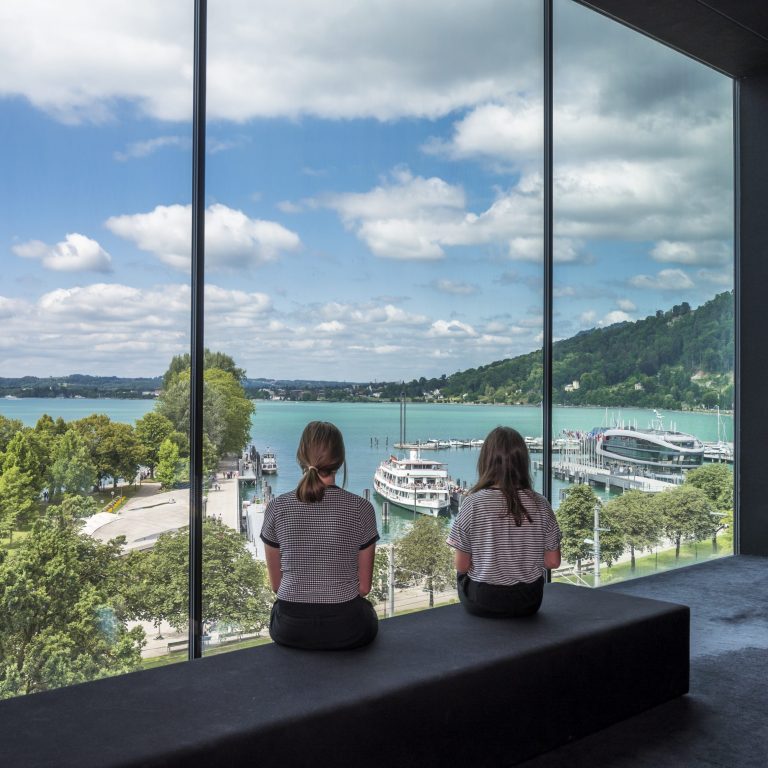
C Florian Pumhösl’s panorama room at the vorarlberg museum © Gregor Lengler
Experiencing the town Bregenz
with austriaguide Sabine Spiegel

C Florian Pumhösl’s panorama room at the vorarlberg museum © Gregor Lengler
with austriaguide Sabine Spiegel
Austriaguide Sabine Spiegel knows why the heart of the town is situated on the waterfront. And, during her guided tour of Bregenz, she also reveals where the best place to talk about art is
TEXT: KORNELIA DIETRICH
So let’s take it from the top, in other words, let’s start in the cosy upper town: only a handful of small streets, surrounded by a ring wall in olden times and fortified by several towers – that’s what the fort settlement that the Counts of Montfort built on the hill above Lake Constance in the 13th century looked like. We are standing under the last surviving gate to the mighty building at Ehregutaplatz 1 and are looking around: medieval houses everywhere, cobblestones, shutters, lots of half-timbered structures. “There are no hotels, restaurants or bars up here”, says Sabine, “which means that only people who live here can stay overnight.” And that’s just a small community of residents who know each other and who lovingly tend its squares and front gardens: fig trees, rosebushes, lavender, everything is in bloom and fragrant, which also delights the walkers who come to enjoy the view across the city, the countryside, the mountains and the lake from above.
Sabine is an Austriaguide, a certified tour guide. Austriaguides speak at least one additional language and continue to regularly educate themselves further – many also offer special tours dedicated to specific topics. Sabine is an ambassador for guests with whom she shares her expert knowledge of the Vorarlberg state capital of Bregenz. The city does need to make some additional effort because it’s not outstandingly beautiful everywhere and it doesn’t have a picturesque old town at its heart. But it is a vibrant city of business – and it is situated directly on the waterfront. Sooner or later, everyone is drawn to the shores of Lake Constance, but first it’s necessary to cross the wide through road and then the railway lines.
But perhaps it’s a blessing that Bregenz doesn’t only have picturesque aspects to offer because contemporary artists have always found it easy to make their mark here: Heinz Gappmayr, for instance, painted the number 0.0000000001 mm in huge letters on the wall of a house on Rathausstraße. A very small measure of length in oversized writing – it catches the eyes of everyone passing by. People who don’t know each other chat about what the number means – just as the artist intended. A stumbling block, a pause in everyday life, visual poetry.
Art in public spaces is one of Bregenz’s strengths, that’s what makes it so charming, there are exciting works to discover everywhere.
Particularly at the KUB, the Kunsthaus Bregenz, of course. The building polarises: Swiss architect Peter Zumthor created a simple cube clad with large glass shingles that pick up the colour of the nearby lake – a dark grey on rainy days and a light blue when it’s sunny. Artists loved the high, elegant rooms from the outset: Miriam Kahn, Mika Rottenberg and Simon Fujiwara, for example, have installed large exhibitions since the building was completed in 1997. But some of Bregenz’s residents weren’t that happy with their new Kunsthaus. Many thought it was too bare and even the prestigious accolades for architecture that have been heaped on it did nothing to change their opinions. “I didn’t like it much at first,” says Sabine.
But it was like a switch was flipped at some point. I noticed that I become very calm when I’m inside the Kunsthaus – it’s as if the building was slowing me down – the architect must have planned it that way.
The second famous museum was also controversial: the listed façade of the former district administration building, which, like the KUB, is located not far from Lake Constance on Kornmarktplatz, was transformed into the vorarlberg museum. This was achieved by placing a white plinth on it and decorating the concrete with flowers that the artist Manfred A. Mayr cast in the bottoms of PET bottles. Not everyone in Bregenz liked it. But the great experience that awaits inside has reconciled many critics to the museum: there’s a kind of oversized camera obscura on the fourth floor, which is a dark panorama room with a window that takes up a whole wall to present a view of the lake. “Wow! I would never have expected that!” One girl whispers.
People get together at the museum on every second Tuesday of the month for the ‘Erzählcafé’ (‘Storytelling Café’). The topics: growing old, community and cohesion, or: life where Vorarlberg is home. That’s when visitors are also able to tell their stories and talk to each other about the often touching contributions – an unusually beautiful place for encounters. “The lake promenade is the heart of Bregenz,” says Sabine. This is where the pulse of life beats when the bar on the Fischersteg opens for aperitifs and visitors on their way to the Bregenz Festival’s lake stage start chatting excitedly about how much they’re looking forward to the opera. The enthusiasm is infectious here and visitors are able to immerse themselves in the shimmering atmosphere between the Festspielhaus and the bold structure that is the casino.